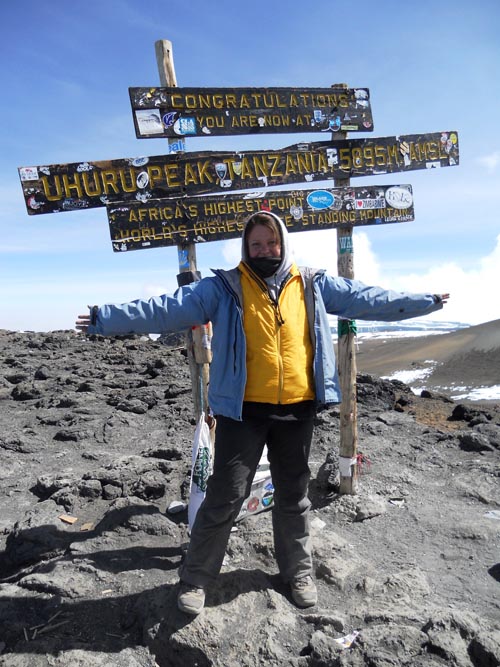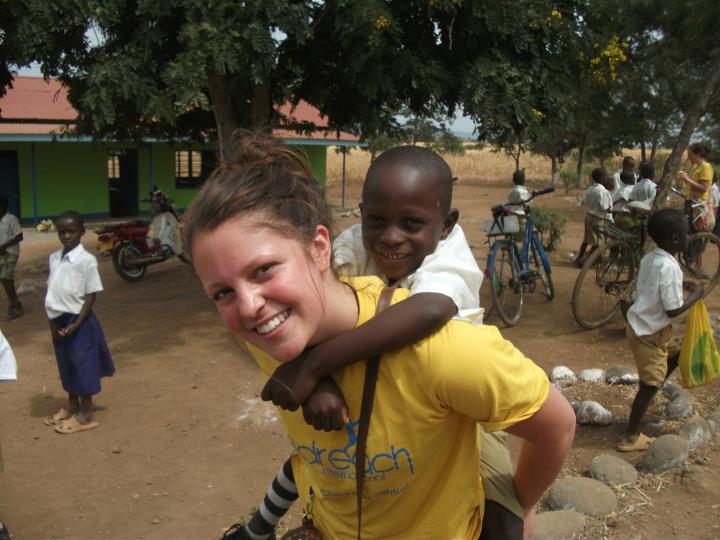
Jesse Freeborn on Top of the World for Childreach International
"Just before we reached Uhuru Peak on Kilimanjaro, my brain was pounding so badly it felt as if it was going to explode through my ears. I started throwing up black vomit and I got diarrhea at the same time. I was physically a mess. I knew I was close to the goal though. I knew I had to think positive. I knew if I could just hang in there a little longer, I would reach the summit."
-- Jesse Freeborn
Attitude is more impressive to me than money, credentials, appearance, or even talent. Attitude is something that lives deep within us. When life throws all kinds of curve balls at us, I believe that 90% of the outcome has to do with how we react.
When my beautiful, petite-sized, 22 year old niece, learning assistant Jesse Freeborn, facebooked me asking if I would sponsor her climb up Mount Kilimanjaro, I inhaled deeply. Like most people, I'd read the stories about Kili. I'd also spent time doing relief work in Tanzania. I understood why the Masai call this perilous peak which stands 19,341 feet high in the African skies (the largest freestanding mountain in the world) "The House of God." World famous celebrities had taken the challenge before Jesse to raise awareness for worthy causes. Like most people, I also knew the stories about celebrities whom, despite extensive training, planning and strong support have failed to reach the summit, including billionaire soccer club owner Roman Abramovich and tennis superstar Martina Navratilova. "Why do you want to do this?" I asked Jesse.
"I want to climb for two reasons." she replied. "I want to show my students, by my own example, the importance of having a positive mental attitude when facing what seems like impossible challenges in life. I also want to teach them the importance of appreciating the things we all take for granted. I've discovered and connected with Childreach International, a children's charity with a clear vision. My best friend, Chris Capell, will be the team leader for Childreach, and I feel safe in the knowledge he'll be guiding me up the mountain."
The Childreach International organization, which has offices in both England and the US, partner with local communities in the developing world to improve children's access to healthcare and education, and to restore child rights. Children are empowered to create positive change in their lives through sustainable community based solutions.
Jesse signed up for Childreach International's Climb Kilimanjaro expedition, an initiative which Childreach strongly believes will help educate the younger generations on the social issues faced by the developing world so they can actively work to make a difference. How hard could this challenge be, right?
Altitude sickness is still not fully understood. What is known is that it is hard to predict who will be susceptible to its effects when ascending Kilimanjaro. If we assume a healthy person's normal blood oxygen reading is in the high 90's, near the top of Kili it is not uncommon for oxygen readings to be in the mid 70's. There are known to be three main forms of altitude sickness. The first is called AMS or Acute Mountain Sickness (not enough oxygen for your body to function normally), and this is fairly common when climbing Kilimanjaro. The second, HAPE (High Altitude Pulmonary Edema), is a potentially deadly condition in which the lung arteries develop excessive pressure in response to low oxygen, resulting in overflow of fluid into your lungs. The third, HACE, is again a potentially fatal form of AMS where the brain actually swells and stops functioning in a normal way. While HAPE and HACE are potentially fatal, they are rare in a well planned climb. Then there are other run of the mill symptoms (considered normal and not related to altitude sickness) you need to prepare for. For example, insomnia, frequent urination, being out of breath or breathing faster, and stopping to breathe for up to 15 seconds and then suddenly breathing very fast to make up for it.
Jesse trained for 6 months prior to the trip. This involved getting up early enough to walk 2 hours to work every day. After work she would run all the way home. In addition, she took spin sessions combined with weight sessions at her local gym. She also discovered Bikram Yoga which helped with her breathing and improved her stamina.
Upon their arrival in Tanzania and prior to beginning the Kilimanjaro ascent, Jesse and her group from Childreach International spent time getting to know and bond with the children they had come to help. They were actually able to see in their school visit where the money (approx $180,000) she and her team had raised for Childreach was being used i.e. classrooms and new water system. "The children I met in Africa had tremendous respect for their elders. It was so inspiring," said Jesse. "They were ecstatic at the sight of bubbles and the simple balloons which we brought with us. Seeing us with our simple gifts was probably the highlight of their year. Then you think about children back home who are disappointed when they can't have the latest ipad."
She kept a journal on each stage of the 5 day expedition , which included the good experiences with new found friends as well as the horrors of long-drop toilets, minimal washing facilities, extreme temperatures, complete physical exhaustion, and other altitude related symptoms experienced by her team as they forged their seemingly endless trek up the mountain. "People around you are passing out and the Sherpas are having to make them turn back the whole way up. Every time you sit on a rock your eyes shut and you have to force yourself not to pass out," explains Jesse.
I ask Jesse to describe to me how she managed to complete the last, most difficult stage of her journey.
"The Sherpa had me and my friend by the arm," she explains. "We continued to shuffle at an impossibly slow pace, although the thought of being asked to move any faster made me want to cry. The two things that inspired me to ultimately reach the summit were my music and the stunningly beautiful sunrise that was occurring in front of me as we approached the peak. I remember feeling emotionally stronger than I ever have in my life. That feeling enabled me to push myself beyond my limit. If you keep a positive attitude in a situation like this one, you really can achieve anything you set out to do."
Jesse Freeborn - As your name and "your special song" suggest -- "Now You Are Free!"
For more information about Childreach International or to make a donation:

Jesse Freeborn with student in Childreach International project
